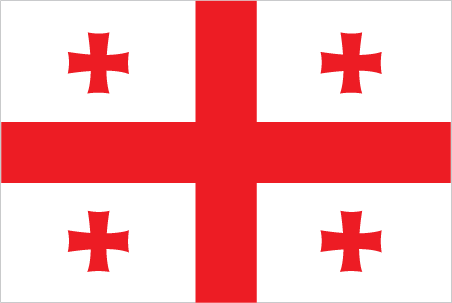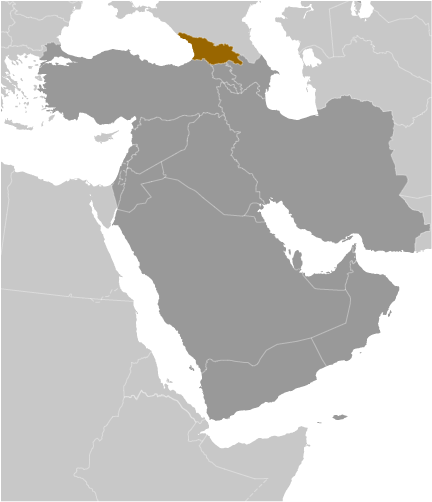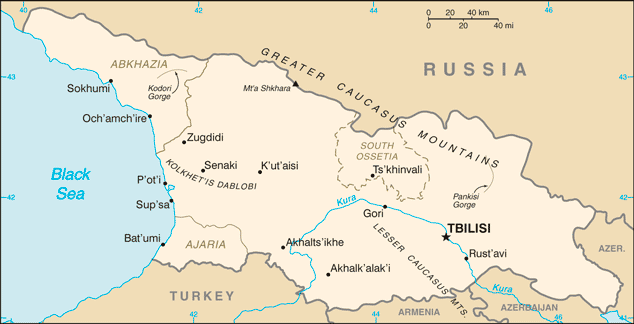The region of present day Georgia contained the ancient kingdoms of Colchis and Kartli-Iberia. The area came under Roman influence in the first centuries A.D. and Christianity became the state religion in the 330s. Domination by Persians, Arabs, and Turks was followed by a Georgian golden age (11th-13th centuries) that was cut short by the Mongol invasion of 1236. Subsequently, the Ottoman and Persian empires competed for influence in the region. Georgia was absorbed into the Russian Empire in the 19th century. Independent for three years (1918-1921) following the Russian revolution, it was forcibly incorporated into the USSR until the Soviet Union dissolved in 1991. An attempt by the incumbent Georgian government to manipulate national legislative elections in November 2003 touched off widespread protests that led to the resignation of Eduard SHEVARDNADZE, president since 1995. New elections in early 2004 swept Mikheil SAAKASHVILI into power along with his National Movement party. Progress on market reforms and democratization has been made in the years since independence, but this progress has been complicated by Russian assistance and support to the breakaway regions of Abkhazia and South Ossetia. After a series of Russian and separatist provocations in summer 2008, Georgian military action in South Ossetia in early August led to a Russian military response that not only occupied the breakaway areas, but large portions of Georgia proper as well. Russian troops pulled back from most occupied Georgian territory, but in late August 2008 Russia unilaterally recognized the independence of Abkhazia and South Ossetia. This action was strongly condemned by most of the world's nations and international organizations.
Population
4,600,825 (July 2010 est.)
Country comparison to the world:120
Nationality
Noun:Georgian(s)
Adjective:Georgian
Ethnic groups
Georgian 83.8%, Azeri 6.5%, Armenian 5.7%, Russian 1.5%, other 2.5% (2002 census)
Religions
Orthodox Christian 83.9%, Muslim 9.9%, Armenian-Gregorian 3.9%, Catholic 0.8%, other 0.8%, none 0.7% (2002 census)
Languages
Georgian 71% (official), Russian 9%, Armenian 7%, Azeri 6%, other 7%
note: Abkhaz is the official language in Abkhazia
Country Name
Conventional long form:none
Conventional short form:Georgia
Local long form:none
Local short form:Sak'art'velo
Former:Georgian Soviet Socialist Republic
Government Type
republic
Capital
Name:T'bilisi
Geographic coordinates:41 43 N, 44 47 E
Time difference:UTC+4 (9 hours ahead of Washington, DC during Standard Time)
Administrative divisions
9 regions (mkharebi, singular - mkhare), 1 city (k'alak'i), and 2 autonomous republics (avtomnoy respubliki, singular - avtom respublika)
regions: Guria, Imereti, Kakheti, Kvemo Kartli, Mtskheta-Mtianeti, Racha-Lechkhumi and Kvemo Svaneti, Samegrelo and Zemo Svaneti, Samtskhe-Javakheti, Shida Kartli
city: Tbilisi
autonomous republics: Abkhazia or Ap'khazet'is Avtonomiuri Respublika (Sokhumi), Ajaria or Acharis Avtonomiuri Respublika (Bat'umi)
note: the administrative centers of the two autonomous republics are shown in parentheses
Independence
9 April 1991 (from the Soviet Union)
National Holiday
Independence Day, 26 May (1918); note - 26 May 1918 was the date of independence from Soviet Russia, 9 April 1991 was the date of independence from the Soviet Union
Constitution
adopted 24 August 1995
Legal system
based on civil law system; accepts compulsory ICJ jurisdiction
Suffrage
18 years of age; universal
Executive branch
Chief of state:President Mikheil SAAKASHVILI (since 25 January 2004); the president is the chief of state and serves as head of government for the power ministries of internal affairs and defense
Head of government:Prime Minister Nikoloz GILAURI (since 6 February 2009); the prime minister is head of government for all the ministries of government except the power ministries of internal affairs and defense
Cabinet:Cabinet of Ministers
(For more information visit the World Leaders website)
Elections: president elected by popular vote for a five-year term (eligible for a second term); election last held on 5 January 2008 (next to be held in January 2013)
Election results:Mikheil SAAKASHVILI reelected president; percent of vote - Mikheil SAAKASHVILI 53.5%, Levan GACHECHILADZE 25.7%, Badri PATARKATSISHVILI 7.1%
Legislative branch
unicameral Parliament or Parlamenti (also known as Supreme Council or Umaghlesi Sabcho) (150 seats; 75 members elected by proportional representation, 75 from single-seat constituencies; members to serve five-year terms)
Elections:last held on 21 May 2008 (next to be held in the spring of 2012)
Election results:percent of vote by party - United National Movement 59.2%, National Council-New Rights (a Joint Opposition, nine-party bloc) 17.7%, Christian Democratic Movement 8.8%, Labor Party 7.4%, Republican Party 3.8%; seats by party - United National Movement 120, National Council-New Rights 16, Christian Democratic Movement 6, Labor Party 6, Republican Party 2
Judicial branch
Supreme Court (judges elected by the Supreme Council on the president's or chairman of the Supreme Court's recommendation); Constitutional Court; first and second instance courts
Political Parties and Leaders
Christian Democratic Movement [Giorgi TARGAMADZE]; Conservative Party [Kakha KUKAVA]; Democratic Movement United Georgia [Nino BURJANADZE]; For Fair Georgia [Zurab NOGAIDELI]; Georgian People's Front [Nodar NATADZE]; Georgia's Way Party [Salome ZOURABICHVILI]; Greens [Giorgi GACHECHILADZE]; Industry Will Save Georgia (Industrialists) or IWSG [Georgi TOPADZE]; Labor Party [Shalva NATELASHVILI]; National Democratic Party or NDP [Bachuki KARDAVA]; National Forum [Kakhaber SHARTAVA]; New Rights [David GAMKRELIDZE]; Our Georgia-Free Democrats (OGFD) or Alliance for Georgia [Irakli ALASANIA]; People's Party [Koba DAVITASHVILI; Republican Party [David USUPASHVILI]; Socialist Party or SPG [Irakli MINDELI]; Traditionalists [Akaki ASATIANI]; United National Movement or UNM [Mikheil SAAKASHVILI]
Political pressure groups and leaders
separatists in the breakaway regions of Abkhazia and South Ossetia
International organization participation
ACCT (observer), ADB, BSEC, CE, EAPC, EBRD, FAO, GCTU, GUAM, IAEA, IBRD, ICAO, ICC, ICCt, ICRM, IDA, IFAD, IFC, IFRCS, ILO, IMF, IMO, Interpol, IOC, IOM, IPU, ISO (correspondent), ITSO, ITU, ITUC, MIGA, OAS (observer), OIF (observer), OPCW, OSCE, PFP, SECI (observer), UN, UNCTAD, UNESCO, UNIDO, UNWTO, UPU, WCO, WFTU, WHO, WIPO, WMO, WTO
Diplomatic representation in the US
Chief of mission:Ambassador Batu KUTELIA
Chancery:2209 Massachusetts Avenue NW, Washington, DC 20008
Telephone:[1] (202) 387-2390
FAX:[1] (202) 393-4537
Consulate(s) general:New York
Diplomatic representation from the US
Chief of mission:Ambassador John BASS
Embassy:11 George Balanchine Street, T'bilisi 0131
Mailing address:7060 T'bilisi Place, Washington, DC 20521-7060
Telephone:[995] (32) 27-70-00
FAX:[995] (32) 53-23-10
Flag description
white rectangle, in its central portion a red cross connecting all four sides of the flag; in each of the four corners is a small red bolnur-katskhuri cross; the five-cross flag appears to date back to the 14th century










